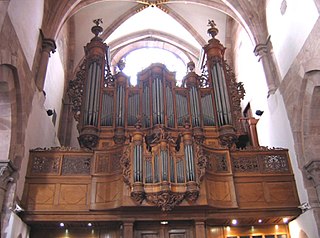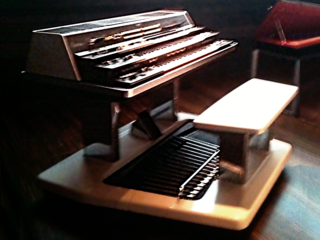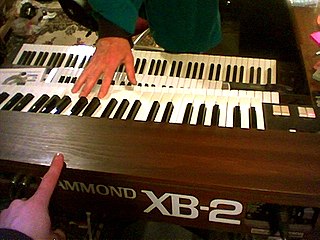Related Research Articles

An electronic musical instrument or electrophone is a musical instrument that produces sound using electronic circuitry. Such an instrument sounds by outputting an electrical, electronic or digital audio signal that ultimately is plugged into a power amplifier which drives a loudspeaker, creating the sound heard by the performer and listener.

The Hammond organ is an electric organ invented by Laurens Hammond and John M. Hanert and first manufactured in 1935. Multiple models have been produced, most of which use sliding drawbars to vary sounds. Until 1975, Hammond organs generated sound by creating an electric current from rotating a metal tonewheel near an electromagnetic pickup, and then strengthening the signal with an amplifier to drive a speaker cabinet. The organ is commonly used with the Leslie speaker.

A musical keyboard is the set of adjacent depressible levers or keys on a musical instrument. Keyboards typically contain keys for playing the twelve notes of the Western musical scale, with a combination of larger, longer keys and smaller, shorter keys that repeats at the interval of an octave. Pressing a key on the keyboard makes the instrument produce sounds—either by mechanically striking a string or tine, plucking a string (harpsichord), causing air to flow through a pipe organ, striking a bell (carillon), or, on electric and electronic keyboards, completing a circuit. Since the most commonly encountered keyboard instrument is the piano, the keyboard layout is often referred to as the piano keyboard.

In music, the organ is a keyboard instrument of one or more pipe divisions or other means for producing tones, each played with its own keyboard, played either with the hands on a keyboard or with the feet using pedals.

An electronic keyboard, portable keyboard, or digital keyboard is an electronic musical instrument, an electronic derivative of keyboard instruments. Electronic keyboards include synthesizers, digital pianos, stage pianos, electronic organs and digital audio workstations. In technical terms, an electronic keyboard is a synthesizer with a low-wattage power amplifier and small loudspeakers.

Girolamo Alessandro Frescobaldi was an Italian composer and virtuoso keyboard player. Born in the Duchy of Ferrara, he was one of the most important composers of keyboard music in the late Renaissance and early Baroque periods. A child prodigy, Frescobaldi studied under Luzzasco Luzzaschi in Ferrara, but was influenced by many composers, including Ascanio Mayone, Giovanni Maria Trabaci, and Claudio Merulo. Girolamo Frescobaldi was appointed organist of St. Peter's Basilica, a focal point of power for the Cappella Giulia, from 21 July 1608 until 1628 and again from 1634 until his death.

Brent Mydland was an American keyboardist and singer. He was a member of the rock band The Grateful Dead from 1979 to 1990, a longer tenure than any other keyboardist in the band.

An electric organ, also known as electronic organ, is an electronic keyboard instrument which was derived from the harmonium, pipe organ and theatre organ. Originally designed to imitate their sound, or orchestral sounds, it has since developed into several types of instruments:

A pedalboard is a keyboard played with the feet that is usually used to produce the low-pitched bass line of a piece of music. A pedalboard has long, narrow lever-style keys laid out in the same semitone scalar pattern as a manual keyboard, with longer keys for C, D, E, F, G, A and B, and shorter, raised keys for C♯, D♯, F♯, G♯ and A♯. Training in pedal technique is part of standard organ pedagogy in church music and art music.

Bass pedals are an electronic musical instrument with a foot-operated pedal keyboard with a range of one or more octaves. The earliest bass pedals from the 1970s consisted of a pedalboard and analog synthesizer tone generation circuitry packaged together as a unit. The bass pedals are plugged into a bass amplifier or PA system so that their sound can be heard. Since the 1990s, bass pedals are usually MIDI controllers, which have to be connected to a MIDI-compatible computer, electronic synthesizer keyboard, or synth module to produce musical tones. Some 2010s-era bass pedals have both an onboard synth module and a MIDI output.
Keyboard expression is the ability of a keyboard musical instrument to change tone or other qualities of the sound in response to velocity, pressure or other variations in how the performer depresses the keys of the musical keyboard. Expression types include:

A MIDI keyboard or controller keyboard is typically a piano-style electronic musical keyboard, often with other buttons, wheels and sliders, used for sending MIDI signals or commands over a USB or MIDI 5-pin cable to other musical devices or computers. MIDI keyboards lacking an onboard sound module cannot produce sounds themselves, however some models of MIDI keyboards contain both a MIDI controller and sound module, allowing them to operate independently. When used as a MIDI controller, MIDI information on keys or buttons the performer has pressed is sent to a receiving device capable of creating sound through modeling synthesis, sample playback, or an analog hardware instrument. The receiving device could be:

A clonewheel organ is an electronic musical instrument that emulates the sound of the electromechanical tonewheel-based organs formerly manufactured by Hammond from the 1930s to the 1970s. Clonewheel organs generate sounds using solid-state circuitry or computer chips, rather than with heavy mechanical tonewheels, making clonewheel organs much lighter-weight and smaller than vintage Hammonds, and easier to transport to live performances and recording sessions.

The Nord Electro is a series of electronic keyboards, developed in Sweden by Clavia, that digitally emulate electro-mechanical keyboards, such as electric pianos and electronic organs, while designed to be highly portable.
The Nord Stage is a digital keyboard or stage piano, manufactured by Clavia Digital Music Instruments of Stockholm, Sweden. There have been five editions of the instrument: the original Nord Stage in 2005, the Nord Stage EX in 2008, the Nord Stage 2 in 2011, the Nord Stage 2 EX in 2015, and the Nord Stage 3 in 2017.

An organ trio is a form of jazz ensemble consisting of three musicians; a Hammond organ player, a drummer, and either a jazz guitarist or a saxophone player. In some cases the saxophonist will join a trio which consists of an organist, guitarist, and drummer, making it a quartet. Organ trios were a popular type of jazz ensemble for club and bar settings in the 1950s and 1960s, performing a blues-based style of jazz that incorporated elements of R&B. The organ trio format was characterized by long improvised solos and an exploration of different musical "moods".

The Roland VK-7 is an electronic keyboard introduced in 1997 which simulates the sound of an electromechanical Hammond organ. Like other electronic musical instruments that emulate the sound of the electromechanical tonewheel-based organs formerly manufactured by Hammond, the VK-7 is referred to as a clonewheel organ. Currently it is replaced by the VK-8 and the VK-88.

Hauptwerk is a computer program, brought by Milan Digital Audio, designed to allow the playback or live performance of pipe organ music using MIDI and recorded sound samples. In other words, Hauptwerk is a software that allows its user to play a variety of sample sets using a keybord known as the MIDI keyboard. These sample sets are the different organs which are availabe for the user to play in Hauptwerk.
The Korg CX-3 is an electronic clonewheel organ with drawbars that simulates the sound of an electromechanical Hammond organ and the Leslie speaker, a rotating speaker effect unit. The CX-3 was first introduced in 1979.

Diversi Musical Products, Inc is a manufacturer of electric organs. It specializes in making clones of the Hammond organ and became popular when jazz organists "Papa" John and Joey DeFrancesco "defected" from Hammond to using their organs instead.